- Home
- Matt Rogers
Savages: A Jason King Thriller (The Jason King Files Book 3) Page 6
Savages: A Jason King Thriller (The Jason King Files Book 3) Read online
Page 6
King didn’t respond.
He flew past, kicking mud off the jeep’s tyres. One of the geysers splattered across the bull bar of the nearest pick-up truck. It was a sparkling Ford Raptor, new enough to have been shipped over from stateside a week ago. Something told him it was Wyatt’s vehicle.
Good, he thought.
He left the four men behind, oblivious to their evil deeds, knowing he wouldn’t be able to let it rest if he forcibly enquired.
Something told him it wouldn’t be wise to start a war with a mercenary force.
Not out here.
Not when the men had that kind of financial backing.
He let it go…
…even though every fibre of his being screamed at him to turn around and wipe the goddamn smug expression off his face.
He had to learn when to act, and when not to.
10
Brody’s compound.
Those words had been rolling through King’s head for the better part of a full day, tantalising in their vagueness, providing all kinds of fantastical mental images regarding what he might find on the border of Lake Kivu, resting in the shadow of Mount Nyiragongo.
In reality, he shouldn’t have been expecting much.
He spotted the chain-link perimeter fence before he noticed the two buildings in the centre of the field. The entire complex had been constructed on the sloping hills descending down to the banks of Lake Kivu, offering one of the more stunning views King had seen in quite some time. The location belonged on a postcard — if one managed to leave out the gruesome violence permeating through civilisation out here. But this portion of the Congo was sparsely populated, far off the beaten track from even the shanty towns themselves.
If not for the open-topped metal vehicle transporting him to the compound at a blistering rate, he might have imagined himself back in prehistoric times, staring out over the jungle with no-one around for miles.
Except the South Africans.
The confrontation had set him on edge. He imagined he would never see any of the four again, but as he pulled up to the front gate, surrounded on both sides by sloping hills, he stared out across the stretch of land between his position and Mount Nyiragongo. The mining operation stood out unnaturally amidst the natural vegetation, a great eyesore. Like a scar on the land itself. He spotted enormous man-made structures — like cranes injected with steroids — hovering over an enormous gorge in the earth. The entire patch of land smoked with activity — even from miles away King could sense opportunity in the air.
The open-pit mining crew were isolated, cut off from the outside world, working in an inhospitable hell hole.
But they were getting paid hand over fist to do so.
And so were the men they were paying to protect them.
Could shoot up a whole goddamn village and no-one would bat an eyelid.
King shut out that memory, compartmentalising it, opting to deal with it later. He had business to attend to here. He left the jeep at the perimeter fence, tucked the MEU pistol into his waistband with the safety engaged, swung the duffel bag over his shoulder and made for the front gate. He left the vehicle unlocked. There was no-one out here to steal it, and it wasn’t his in the first place.
The bulky chain link gates opened without resistance — King froze in place in the centre of the gravel trail, watching the big doors swing inward, gouging a path out of the security perimeter without any effort at all. Brody had left the entrance unlocked and unmanned. Shrugging off the strange occurrence, King hurried straight through, sweating in the Congolese heat but offered a reprieve by the gorgeous views of Lake Kivu to his right.
Now, he understood why Brody had decided to retire in the Congo.
It wasn’t all barbaric. Places like these seemed entirely unpopulated — you could disappear into this corner of the world and live out the rest of your days undisturbed.
Until a mining venture deemed your land necessary for their expansion, or a group of bloodthirsty rebels or militants sensed easy prey.
But he got the sense that a man like Brody carried a certain reputation — he’d seen it in the way the four mercenaries instantly changed their demeanour. His name had weight in this part of the country.
King wondered how much information circulated around the Rwandan border in the form of rumours.
More than he knew, in any case.
The two buildings that made up the entirety of Brody’s compound were situated in the middle of the hills, each erected on what amounted to a small stretch of flat land, providing an exquisite panoramic view over Lake Kivu and its surroundings. King paused for a moment, analysing the position of each building, confused at the choice of placement.
What he guessed was Brody’s home — a long single storey ranch-style building with a sweeping front deck and plenty of room to sit and admire the view — had been blocked off entirely from the postcard views of Lake Kivu by the second building, an enormous corrugated iron warehouse large enough to fit a fleet of twenty vehicles within its walls. The patio ended up facing a great sheet of steel — not exactly King’s first choice of preference.
Why did the warehouse need lake views instead?
More importantly, why hadn’t the buildings just been constructed side by side?
He shrugged it off and hustled for the house, assuming Brody would be residing within. He made it one step up the short flight of stairs before he sensed a flurry of movement behind him. His stomach dropped as he connected the rush of compressed air to a hostile at uncomfortably close range — nothing King could do would prevent what came next.
He half-twisted on the spot before the man hit him, shouldering King in the ribs hard enough to throw him off his feet. The duffel flew in one direction and King went in another, coming down on the wooden deck with all his attacker’s weight on top of him. Intuitively, his hand flew to his belt, searching for the grip of the MEU pistol, but as soon as he snatched the empty air where the gun should have been, he realised the guy on top of him had already wrenched the weapon free.
The man tossed it away and quickly re-positioned himself, pressing the top of his head into King’s chest to add an extra point of manipulation. King had been mid-scramble, in the act of using all two hundred plus pounds of his bodyweight to force his way to his feet. It worked nine times out of ten — brute strength carried a distinct advantage in a street fight — and from simple contact he could sense his attacker weighed at least twenty pounds less.
But — grimacing as he realised his mistake — he only made it a few inches off the ground before the attacker drove his head down into King’s chest and smashed him back to the deck, shoving him up against the nearest wall of the house.
King spluttered and tried again, throwing all his energy into another attempt to get to his feet.
The attacker manhandled him, jamming him against the wall and the floor, making him hyperventilate. King’s breath came in short, rattling gasps — he could beat up mercenaries and thugs and trained combatants for hours on end, but here he found himself simply unable to move.
For added insult, the attacker levered a few inches of space between them and feigned a series of devastating elbows, pulling each strike just short of King’s throat. On the third faked shot King tried to move, to explode off the floor, to do anything, but a simple adjustment and use of leverage sent him crashing back into the floor, the back of his head slamming against the wall on the way down.
The attacker mimed another elbow, then a straight punch to the bridge of the nose, then a massive headbutt, then he shoved King back into the floor and leapt into a crouch over the top of him, mimicking a couple of brutal knees to the ribcage — both of which would have torn muscles and broken bones.
The guy climbed to his feet, leaving King in a panting heap on the deck. None of the shots had actually connected — each pulled slightly short — but the displaced air had washed over King time after time, leaving him rattled. He didn’t experience this sensation often — the
man standing over him could have beat him to death without losing his breath.
‘That’s why they sent you, kid,’ the guy said. ‘You’ve got a lot of strength but sooner or later you’ll run into someone who throws you around like that and caves your face in. And Lars thinks you have something special — so, you’re worth my time.’
King didn’t know what to say. A certain power dynamic had unfolded before his eyes, one he hadn’t been on the receiving end of in quite some time.
Not since before the military.
Not since childhood.
He felt like a kid wrestling with his father.
But he was a two hundred pound muscle-clad black operations killer, and he’d been trying with every ounce of strength in his body to get back to his feet.
The encounter left him truly shaken.
The man standing over him looked to be in his early forties, a few inches shorter than King with a lean wiry physique. Muscle sinew covered every bare patch of skin, rippling with the kind of strength that King had only seen a handful of times in his life. The strength that defied common knowledge, the deceptive power that simply baffled opponents when someone laid their hands on a man of identical weight and simply manhandled them around like they weighed nothing.
King usually did that to people.
Now on the receiving end, he squirmed in discomfort.
The guy was dressed in a plain T-shirt and faded workout shorts, hanging loose on his frame. His long auburn hair showed no signs of receding, even at his age. His eyes were the colour of Lake Kivu — sparkling blue and full of life. King hadn’t seen that often either — a man with a genuine intensity. Nothing about this guy was fake. His skin was deeply tanned after years in the Congolese sun.
And, even though the implications were humiliating, King had to concede that the guy couldn’t have weighed more than a hundred and seventy pounds.
He was, by all definitions, the smaller man.
How? King thought.
The guy read his mind. He smirked and offered a hand — King took it and the man hauled King to his feet in one swift motion. ‘Bet you’re not used to that.’
‘Can’t say I am.’
‘You’re Jason King.’
‘And you’re Brody…’
‘Just Brody.’
‘Right.’
‘Want a drink?’ Brody said, then hurried straight past King into the house.
11
The silence that unfolded in the small kitchen dripped with unspoken questions.
King wanted to let out everything on his mind at once, but he relented. He allowed Brody to fetch an ice-cold long necked beer bottle out of the fridge and yank the top off with a bottle opener. He slid the drink across the counter and King took a long pull from the neck, eager to still his racing pulse.
It was a unique incident.
He hadn’t actually been in any danger, and he’d recognised that within the first few seconds of the encounter. He’d caught a glance of casual clothing and a ponytail and figured it was Brody on top of him, even though he had no idea what the man looked like.
He’d gone through most of the scuffle aware that he wouldn’t end up dead at the end of it.
But that almost made it worse.
He’d bucked and writhed with all his strength, and Brody would know that. He’d have felt it.
A certain weakness was always displayed when a man exerted himself to maximum capacity with no success.
They hadn’t discussed it, but it was there, palpable in the air.
‘No trouble on the way over?’ Brody said, cracking open a beer of his own.
Finally, in the air conditioned comfort of Brody’s house, King had stopped sweating. ‘You mean on the way to the Congo or on the drive to your place?’
‘Both.’
‘None with the former. Some with the latter.’
‘Did Lars throw you in a cargo plane?’
‘Is that common?’
‘You’re lucky you haven’t been exposed to the rant yet. He’ll go on for a solid half hour about the benefits of buying anonymous slots on shoddy international transport flights. He doesn’t understand why the Special Forces don’t uniformly adopt that method for covert ops.’
‘Glad I’ve been spared.’
‘What trouble did you run into on the way here?’
‘Nothing major. Small civilian dispute and a few restless mercs.’
‘Mercs?’
‘South African guys. From the mine.’
‘Oh,’ Brody said. ‘Those slimeballs.’
‘I got the impression they’re not your biggest fans.’
‘And what gave you that?’
‘They were ready to shoot me dead in the street until I told them I was here to visit you. But that didn’t kill the tension… everything got uneasy after that. Like they disapproved of you.’
‘I don’t blame them.’
‘You lot got history?’
‘They paid me a visit about a year ago. Six of them.’
‘I only ran into four.’
‘Bastard called Wyatt still with them?’
‘Yeah. Seems like the ringleader. What’d they do to you a year ago?’
‘Nothing. I beat one of them into a bloody pulp. The other five got the message and fucked off back to their mine. Haven’t heard from them since. Get dark looks when I pass them, though.’
‘That was a risk.’
Brody drained the rest of his beer and raised an eyebrow. ‘Was it? Didn’t know you’d been here long enough to form an opinion.’
‘They seem like dangerous guys with a lot of spare cash and some time on their hands. Not a good combination.’
Brody simply stared at him. The silence stretched out, reaching an uncomfortable length. King twirled the beer in his hands and sipped at it intermittently, hesitant to plug the gap in conversation with needless filler. Brody didn’t seem like the type. And it seemed like he’d triggered a nerve of some kind with his last comment.
Finally, the man responded. ‘You speak well. You keep your head high. I like that. Gives you a confidence that makes you sound like you know what you’re talking about.’
King raised an eyebrow. ‘I don’t?’
‘How old are you?’
‘You really don’t know?’
‘Of course I know. I know almost everything about you.’
King paused. Throughout all of this, he hadn’t bothered to ask Lars what Brody’s qualifications were. Did he even know about Black Force?
‘I doubt you do,’ King said.
Now Brody laughed, a deep belly laugh that resonated through the low-ceilinged room, ringing off the walls, cutting deep.
‘Oh, kid,’ he said. ‘What you need to learn…’
‘I don’t know anything about you. Sorry if I underestimated…’
Brody reached over the counter and slapped King on the shoulder. ‘Relax. I’m playing. You’re not expected to know.’
For the first time in what felt like forever, King didn’t know what to say. He had never been placed on the back foot like this. His adult life had consisted of a whirlwind of acceleration and destruction, whisked from division to division of the United States military as he astonished superiors and outworked men ten years his senior. He had been consistently upsetting predictions for years now, and breaking records — the youngest Delta Force operator in history, one of the youngest Navy SEALs in history, one of the only men brought across from the Army to the Navy and then back to the Army again.
And finally, it had culminated in Black Force, a solo one-man freight train of a division that had seen him tear through two separate corners of the globe and get more done in a few months than most did it an entire career.
Now, he was entirely out of his depth. A cold shiver ran up his spine.
Brody had belonged to a level of the secret world he hadn’t considered feasible.
‘I don’t know who you are,’ King said. ‘I just know you’re important enough
to send me to the Congo to meet you.’
‘Do you know what you’re here for?’ Brody said.
‘To learn how to get better. At least, those were Lars’ words.’
‘Good words they were. I read a list of the injuries you sustained in Mexico and Somalia. Surprised you’re not permanently disabled, if we’re being honest.’
‘I’m young. I heal fast.’
‘You’re lucky,’ Brody said, and the atmosphere shifted. ‘I counted about fifty separate incidents where an inch of wiggle room would have meant paralysis or death. You think you can keep that up for an entire career?’
His words sounded eerily similar to the spiel Lars had delivered back in Miami. Somehow, they seemed a little more poignant coming from Brody.
‘Uh…’ King said.
‘Well?’
‘I guess not. But I figured—’
‘Figured what?’
Usually King would turn irate at someone consistently interrupting him. Now, though, he felt sheepish. Like he was being firmly scolded by a parent. ‘I figured experience would teach me. I figured I’d adapt. I’ve done that ever since I stepped foot in the recruiting office.’
‘How old were you?’
‘Sorry?’
‘When you joined the military.’
‘Eighteen.’
‘Good family life?’
‘Reasonable.’
‘Define reasonable.’
‘Not abusive. Just … detached.’
‘Parents still here?’
‘Dad is.’
‘You talk to him?’
‘No.’
‘Right.’
‘I don’t see how this is relevant.’
Brody cocked his head. ‘We might as well get to know each other. You know how long you’re here for?’
‘No.’
‘Neither do I. It’s entirely up to me — based on how well our training goes. I made sure Lars understood that before he sent you here.’
‘I mean… it isn’t entirely up to you. I can choose to leave whenever I want.’
‘You sure?’
‘I can get up and drive back to the airfield right now.’

 Nature and Blight
Nature and Blight The Wolves of Third Clan
The Wolves of Third Clan Ghosts
Ghosts Bear
Bear The Will Slater Series Books 1-3
The Will Slater Series Books 1-3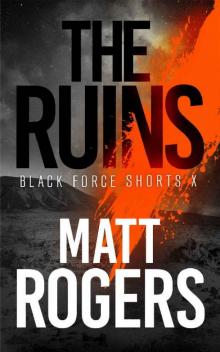 The Ruins
The Ruins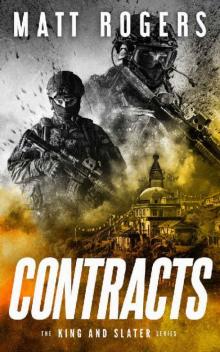 Contracts
Contracts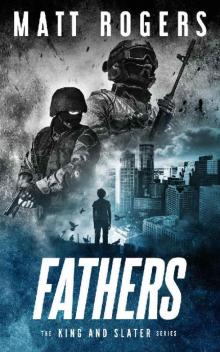 Fathers
Fathers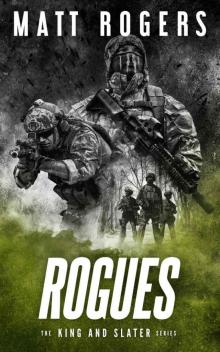 Rogues: A King & Slater Thriller
Rogues: A King & Slater Thriller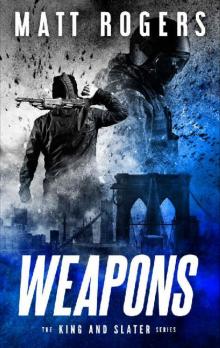 Weapons
Weapons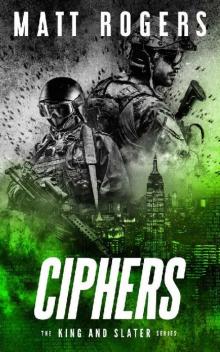 Ciphers
Ciphers Lynx
Lynx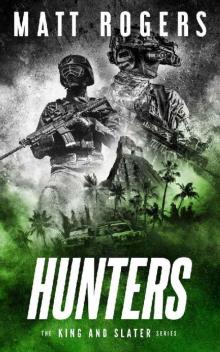 Hunters
Hunters Of Superior Design
Of Superior Design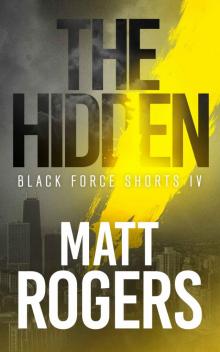 The Hidden: A Black Force Thriller (Black Force Shorts Book 4)
The Hidden: A Black Force Thriller (Black Force Shorts Book 4) Blood Money
Blood Money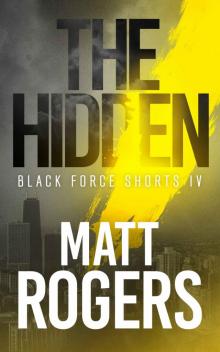 The Hidden_A Black Force Thriller
The Hidden_A Black Force Thriller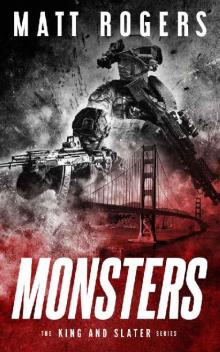 Monsters
Monsters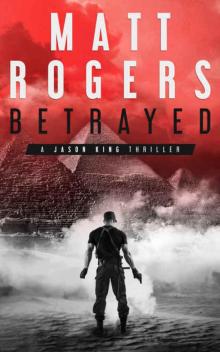 Betrayed: A Jason King Thriller (Jason King Series Book 4)
Betrayed: A Jason King Thriller (Jason King Series Book 4)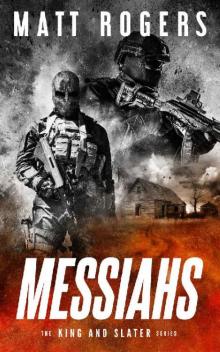 Messiahs
Messiahs The Wicked_A Black Force Thriller
The Wicked_A Black Force Thriller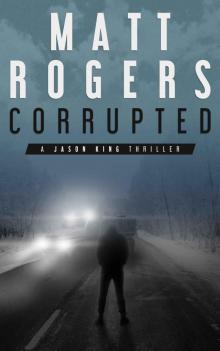 Corrupted: A Jason King Thriller (Jason King Series Book 5)
Corrupted: A Jason King Thriller (Jason King Series Book 5)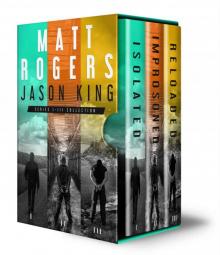 The Jason King Series: Books 1-3
The Jason King Series: Books 1-3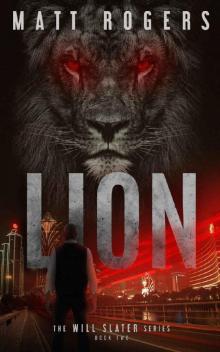 Lion
Lion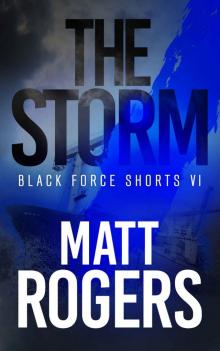 The Storm: A Black Force Thriller (Black Force Shorts Book 6)
The Storm: A Black Force Thriller (Black Force Shorts Book 6)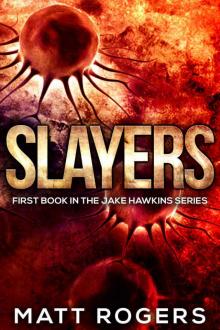 Slayers (Jake Hawkins Book 1)
Slayers (Jake Hawkins Book 1)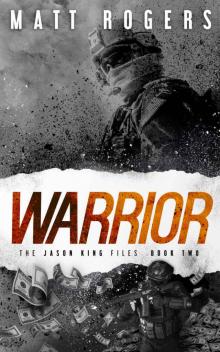 Warrior: A Jason King Thriller (The Jason King Files Book 2)
Warrior: A Jason King Thriller (The Jason King Files Book 2)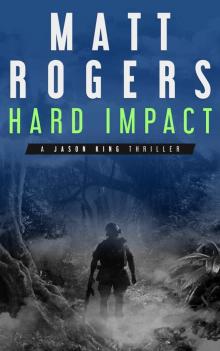 Hard Impact: A Jason King Operation (Jason King Series Book 0)
Hard Impact: A Jason King Operation (Jason King Series Book 0) The Wicked: A Black Force Thriller (Black Force Shorts Book 7)
The Wicked: A Black Force Thriller (Black Force Shorts Book 7)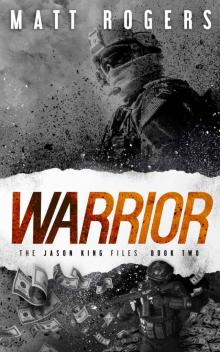 Warrior_A Jason King Thriller
Warrior_A Jason King Thriller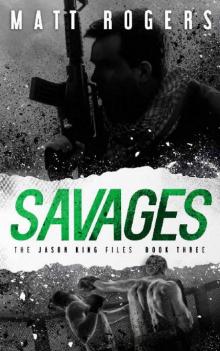 Savages: A Jason King Thriller (The Jason King Files Book 3)
Savages: A Jason King Thriller (The Jason King Files Book 3)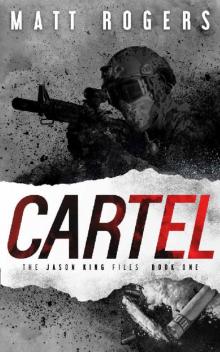 Cartel: A Jason King Thriller (The Jason King Files Book 1)
Cartel: A Jason King Thriller (The Jason King Files Book 1)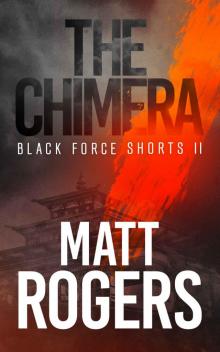 The Chimera_A Black Force Thriller
The Chimera_A Black Force Thriller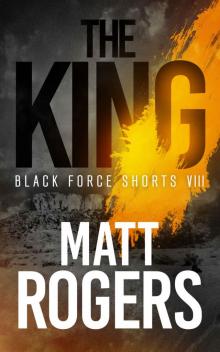 The King: A Black Force Thriller (Black Force Shorts Book 8)
The King: A Black Force Thriller (Black Force Shorts Book 8)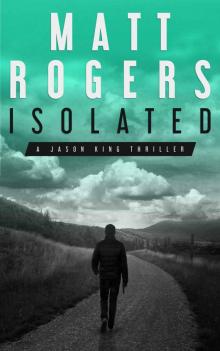 Isolated: A Jason King Thriller (Jason King Series Book 1)
Isolated: A Jason King Thriller (Jason King Series Book 1) The Victor: A Black Force Thriller (Black Force Shorts Book 1)
The Victor: A Black Force Thriller (Black Force Shorts Book 1)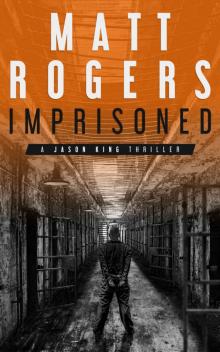 Imprisoned: A Jason King Thriller (Jason King Series Book 2)
Imprisoned: A Jason King Thriller (Jason King Series Book 2)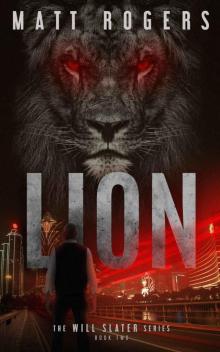 Lion: A Will Slater Thriller (Will Slater Series Book 2)
Lion: A Will Slater Thriller (Will Slater Series Book 2)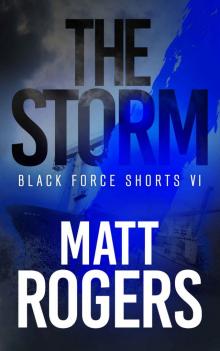 The Storm_A Black Force Thriller
The Storm_A Black Force Thriller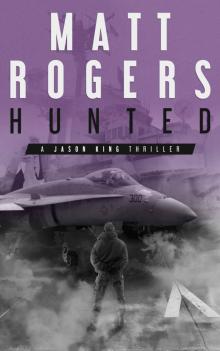 Hunted: A Jason King Thriller (Jason King Series Book 6)
Hunted: A Jason King Thriller (Jason King Series Book 6)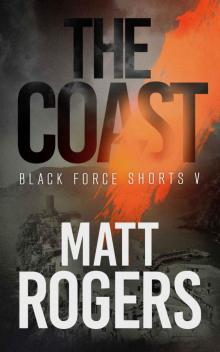 The Coast: A Black Force Thriller (Black Force Shorts Book 5)
The Coast: A Black Force Thriller (Black Force Shorts Book 5)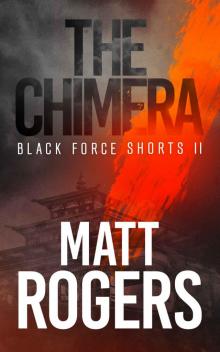 The Chimera: A Black Force Thriller (Black Force Shorts Book 2)
The Chimera: A Black Force Thriller (Black Force Shorts Book 2)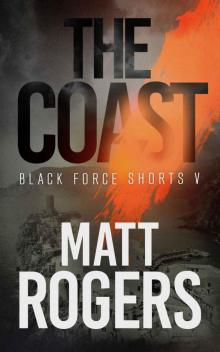 The Coast_A Black Force Thriller
The Coast_A Black Force Thriller